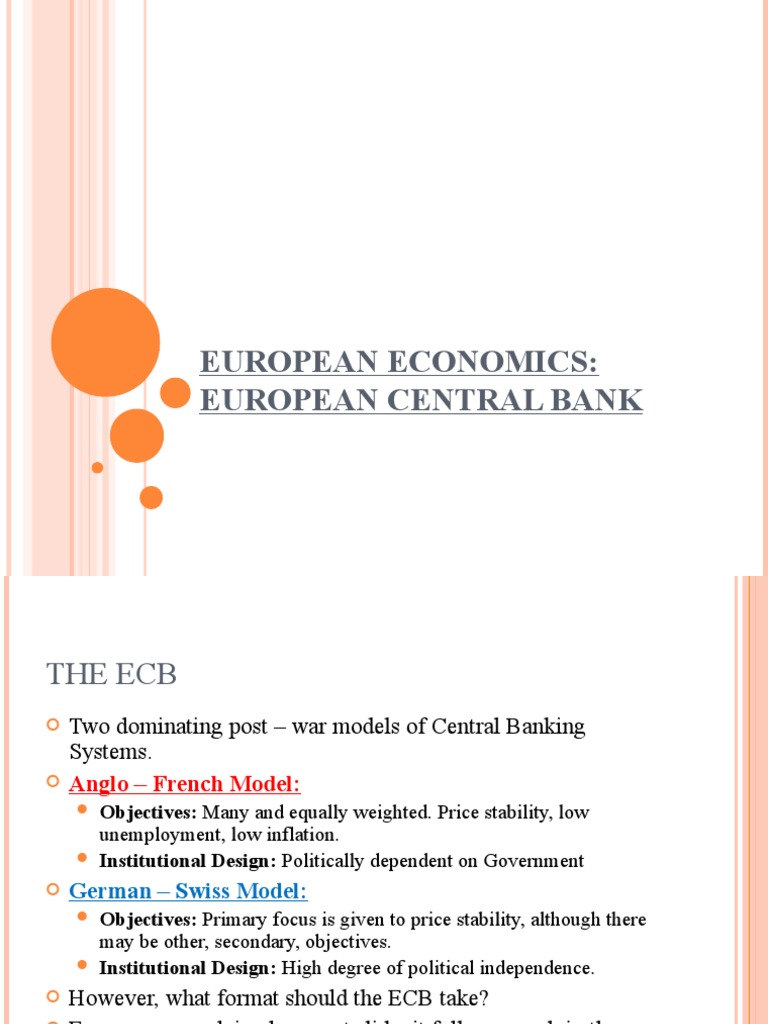European Central Bank Creates Task Force For Regulatory Reform

Table of Contents
The Mandate of the ECB's Regulatory Reform Task Force
The newly formed task force holds a broad mandate encompassing a comprehensive review of the Eurozone's regulatory framework. Its responsibilities extend beyond mere identification of issues; the task force is charged with proposing concrete, actionable solutions. The scope of their review is extensive and aims to modernize and strengthen the existing system.
-
Reviewing existing regulations for effectiveness and efficiency: The task force will meticulously examine current regulations, assessing their impact and identifying areas where improvements can be made to enhance efficiency and reduce unnecessary burdens on financial institutions. This includes evaluating the cost-benefit ratio of existing rules and processes.
-
Identifying gaps and inconsistencies in the current regulatory framework: The review will pinpoint inconsistencies and loopholes within the current system that could pose risks to financial stability. This includes analyzing the interplay between various regulations and identifying areas where harmonization is needed across different jurisdictions within the Eurozone.
-
Proposing concrete recommendations for improvement and modernization: The task force's ultimate goal is to provide specific, actionable recommendations for regulatory improvements. These recommendations will be evidence-based and aim to enhance the resilience of the financial system.
-
Assessing the impact of new technologies (e.g., Fintech) on financial regulation: The rapid development of financial technology (Fintech) presents both opportunities and challenges for the regulatory framework. The task force will analyze the impact of innovations such as cryptocurrencies and decentralized finance (DeFi) and propose suitable regulatory responses.
-
Ensuring alignment with international regulatory standards (e.g., Basel III): The task force will ensure that the Eurozone's regulatory framework remains aligned with international best practices and standards, such as the Basel III accords on banking capital adequacy. This fosters consistency and minimizes regulatory arbitrage.
Key Areas Targeted for Regulatory Reform
The ECB's task force is expected to prioritize several key areas for reform, reflecting current challenges and vulnerabilities within the Eurozone's financial system.
-
Capital adequacy requirements for banks within the Eurozone: The task force will likely review the capital requirements for banks, considering the need for sufficient buffers to absorb potential losses and maintain financial stability. This includes assessing the adequacy of current risk-weighting methodologies.
-
Strengthening stress testing methodologies to better anticipate financial crises: Improving the robustness and accuracy of stress tests is crucial for early identification of potential risks. The task force will examine ways to refine stress testing methodologies, incorporating a wider range of potential shocks and scenarios.
-
Improving supervision of systemically important financial institutions (SIFIs): SIFIs pose a significant risk to the stability of the entire financial system. The task force will likely focus on enhancing the supervision of these institutions, ensuring that they are adequately managed and regulated to mitigate systemic risks.
-
Addressing the challenges posed by shadow banking and Fintech: The rapid growth of the shadow banking sector and the emergence of Fintech pose unique regulatory challenges. The task force will examine the regulatory gaps and propose solutions to mitigate the risks associated with these sectors.
-
Regulatory oversight of cryptocurrencies and digital assets: The increasing use of cryptocurrencies and other digital assets necessitates a clear regulatory framework. The task force will consider how best to regulate these assets to protect consumers and maintain financial stability while fostering innovation.
Expected Outcomes and Timeline of the Regulatory Reform
The task force's work will culminate in the publication of reports outlining their findings and recommendations. These reports will be crucial for shaping future policy decisions.
-
Publication of interim and final reports with recommendations: The task force will likely publish interim reports detailing its progress and findings, followed by a final report containing comprehensive recommendations for regulatory reform.
-
Proposed legislative changes to be submitted to the European Parliament: The ECB will likely submit legislative proposals based on the task force's recommendations to the European Parliament for consideration and adoption.
-
Timeline for the implementation of new regulations: The implementation of new regulations will likely unfold over a period of time, allowing for a phased approach to minimize disruption and ensure smooth integration.
-
Potential impact on bank lending and economic activity: The reforms may have implications for bank lending and overall economic activity, potentially impacting access to credit and investment. A careful assessment of these potential impacts will be crucial.
-
Assessment of the effectiveness of the reforms over time: Ongoing monitoring and evaluation of the implemented reforms will be necessary to gauge their effectiveness and make adjustments as needed.
Potential Impact on Financial Stability and Monetary Policy
The regulatory reforms spearheaded by the ECB's task force have the potential to significantly improve the stability of the Eurozone's financial system and enhance the effectiveness of monetary policy.
-
Reduced risk of future financial crises: By strengthening the regulatory framework, the reforms aim to reduce the likelihood and severity of future financial crises.
-
Improved resilience of the banking sector: The reforms are intended to increase the resilience of the banking sector, making it better equipped to withstand economic shocks.
-
Enhanced effectiveness of monetary policy transmission: A more stable and resilient financial system can facilitate the effective transmission of monetary policy, improving the ECB's ability to achieve its price stability mandate.
-
Potential impact on economic growth and inflation: The reforms could have a positive impact on economic growth by fostering greater confidence and stability in the financial system.
Conclusion
The establishment of the ECB's task force for regulatory reform is a crucial step toward strengthening the resilience and stability of the Eurozone's financial system. The task force's work will result in significant changes to the regulatory landscape, impacting banking supervision, monetary policy effectiveness, and overall financial stability. The anticipated reforms will address critical areas such as capital requirements, stress testing, and supervision of systemically important institutions, leading to a more robust and resilient Eurozone financial system.
Call to Action: Stay informed about the progress of the ECB's regulatory reform initiatives. Follow our website for updates on the task force's findings and the implementation of new regulations affecting the European Central Bank and the wider Eurozone. Understanding ECB regulatory reform is crucial for anyone involved in European finance.

Featured Posts
-
 Ev Mandate Backlash Car Dealerships Push For Change
Apr 27, 2025
Ev Mandate Backlash Car Dealerships Push For Change
Apr 27, 2025 -
 Ariana Grandes Stunning Transformation Insights Into Professional Hair And Tattoo Services
Apr 27, 2025
Ariana Grandes Stunning Transformation Insights Into Professional Hair And Tattoo Services
Apr 27, 2025 -
 Charleston Open Pegulas Epic Comeback Against Collins
Apr 27, 2025
Charleston Open Pegulas Epic Comeback Against Collins
Apr 27, 2025 -
 Dax Volatility The Impact Of Bundestag Elections And Key Economic Data
Apr 27, 2025
Dax Volatility The Impact Of Bundestag Elections And Key Economic Data
Apr 27, 2025 -
 Belinda Bencic Reaches Abu Dhabi Open Final After Daughters Birth
Apr 27, 2025
Belinda Bencic Reaches Abu Dhabi Open Final After Daughters Birth
Apr 27, 2025
